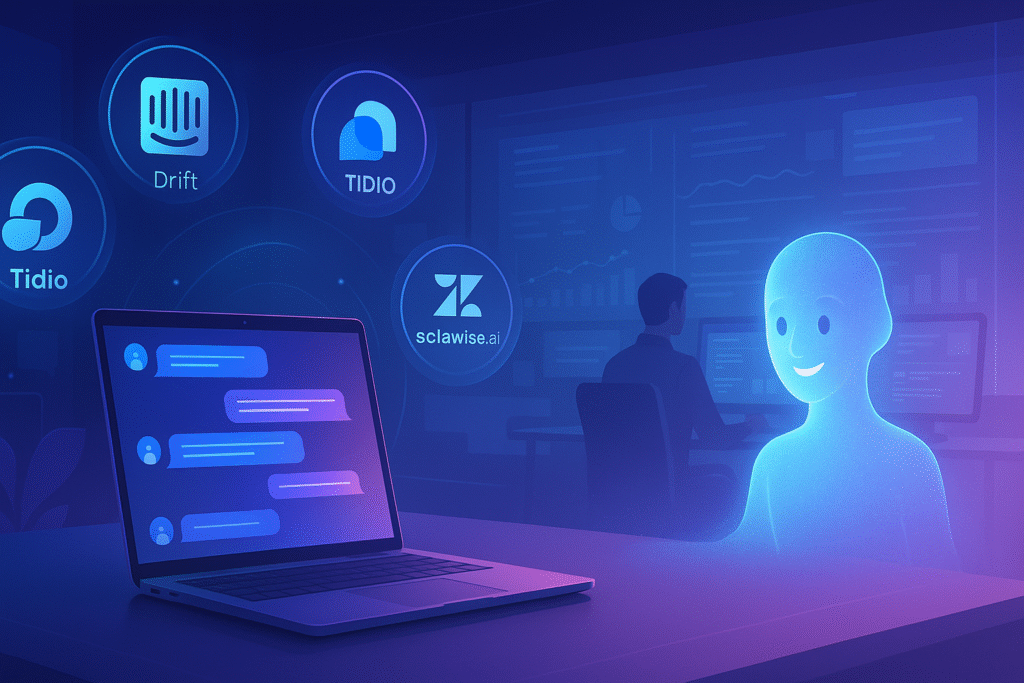“Discover the best AI chatbot platforms for FAQs & live help, including Intercom, Drift, Tidio, Zendesk AI, and Scalewise.ai, to enhance customer support.”
In today’s fast-paced digital world, businesses constantly seek innovative ways to enhance customer experience. This is where AI chatbot platforms step in, transforming how companies manage frequently asked questions (FAQs) and provide real-time assistance. These sophisticated tools are more than just automated responders; they are the frontline of modern customer support, ensuring that help is always at hand, day or night. This article delves into the best AI chatbot platforms, exploring their features, diverse use cases, and the immense benefits they offer businesses striving for superior user engagement. We will also look at how these platforms function, complete with real-world examples, before introducing a cutting-edge no-code solution that empowers businesses to build custom AI agents.

Understanding the Mechanics: How AI Chatbot Platforms Power Customer Support
At their core, AI chatbot platforms for customer support leverage artificial intelligence and machine learning to mimic human conversation. They process natural language, understand user intent, and deliver accurate, relevant responses. Here’s a breakdown of the key elements that make these digital assistants so effective:
Natural Language Processing (NLP): This is the brain of any AI chatbot. NLP enables the bot to comprehend human language as it’s spoken or typed, regardless of slang, grammatical errors, or colloquialisms. When a customer types a query, NLP breaks down the sentence, identifies keywords, and determines the user’s underlying intent. This process allows the chatbot to grasp what customers say and what they truly mean, leading to more natural and effective interactions. For example, if a customer asks, “Where’s my stuff?” the NLP engine recognizes “stuff” as an order and seeks tracking information.
Machine Learning (ML): Some basic chatbots operate on pre-programmed scripts, but the most advanced platforms utilize machine learning. ML allows chatbots to learn from every interaction, continuously improving their responses. Initially, a chatbot might provide a general answer, but through repeated engagements and feedback, it refines its understanding and offers more tailored, precise replies. This continuous learning loop means the chatbot gets smarter with every conversation.
Intent Recognition: A crucial component of chatbot functionality is its ability to recognize intent. This means understanding what the customer wants to achieve—whether to ask a question, make a booking, or resolve a complaint. Chatbots are trained on vast datasets to identify the intent behind each customer query. For instance, if a user types, “I need to update my address,” the chatbot identifies the intent as an account information update and guides the user through the relevant steps.
Context Awareness: The most intelligent chatbots are context-aware. They maintain the flow of a conversation, remembering essential details shared earlier in the interaction. This feature provides a seamless and natural user experience across multiple queries. If a customer provides their order number in an initial message, a context-aware chatbot won’t ask for it again in a follow-up question about the same order. This continuity is vital for a smooth customer journey.
Knowledge Base Integration: For an AI chatbot to be truly informative, it needs a comprehensive knowledge base. This includes FAQs, product documentation, service policies, and other relevant company information. Chatbots access this integrated knowledge base to pull accurate, up-to-date answers. Updating the knowledge base instantly updates the chatbot’s responses if information changes.
Seamless Handoff to Human Agents: Despite their advanced capabilities, AI chatbots aren’t meant to replace human agents entirely. Instead, they enhance human support. When a chatbot encounters a complex or sensitive query it cannot resolve, it seamlessly escalates the conversation to a human agent. Crucially, the chatbot provides the human agent with the entire conversation history and all gathered context, ensuring a smooth transition and preventing customers from repeating themselves.
Analytics and Reporting: Modern AI chatbot platforms have robust analytics and reporting features. These tools track various metrics, such as the number of conversations handled, resolution rates, customer satisfaction scores, and frequently asked questions. Businesses can use this data to identify areas for improvement, refine chatbot responses, and optimize their customer support strategy.
These platforms create a dynamic, efficient, and increasingly intelligent customer service ecosystem. They free human agents to focus on more complex, high-value interactions while providing instant, consistent support for routine inquiries.
The Powerhouse Platforms: Real-World Examples in Action
Several platforms stand out in the crowded AI chatbot market, each bringing unique strengths. Let’s explore some of the leaders in providing AI-driven FAQs and live help:
Intercom: The Conversational Relationship Platform
Intercom is more than just a chatbot; it’s a comprehensive conversational relationship platform designed to help businesses build stronger customer connections. Their AI agent, Fin, is a standout feature that simplifies support for growing companies.
Key Features of Intercom:
- Fin AI Agent: Trained on a business’s oata (help center articles, internal guides, saved replies), Fin can resolve complex queries with high-quality, on-brand answers across various channels. It understands natural language, even with variations in phrasing, and offers 24/7 support.
- Shared Inbox: This central hub allows support teams to manage live chat conversations and tickets efficiently. It provides a complete view of customer interactions, enabling personalized and informed responses.
- Workflows and Automation: Intercom’s no-code visual builder allows businesses to create custom chatbot flows. These workflows automate repetitive tasks, route conversations based on topic or urgency, and collect lead details, operating across chat, email, and social media.
- Proactive Support: Businesses can use Intercom to proactively engage visitors with targeted messages, onboarding checklists, and in-app tips, guiding them through the customer journey.
- Integrations: Intercom seamlessly integrates with popular CRM systems like Salesforce and Zendesk, marketing automation tools, and various other business applications, ensuring data flow and consistency across platforms.
- Reporting: Intercom offers robust analytics to track key metrics like answer rates, deflection rates, and resolution rates, helping businesses optimize their support performance.
Use Cases: Intercom excels in automating customer queries, streamlining lead qualification by engaging website visitors, and providing personalized onboarding experiences. Its ability to summarize long conversations and suggest replies also enhances the productivity of human agents.
Benefits: Intercom helps businesses reduce resolution times, improve customer satisfaction through immediate and consistent support, and scale their support operations without proportionally increasing staff. It is particularly beneficial for companies looking for an integrated solution that combines AI, live chat, and marketing automation.
Drift: Conversational Marketing and Sales Platform
Drift is a conversational marketing and sales leader that uses AI to transform how businesses engage with website visitors. It’s built to qualify leads, accelerate the sales process, and provide personalized real-time conversations.
Key Features of Drift:
- AI-Powered Chatbot: Drift’s AI agents engage visitors with personalized conversations, asking qualifying questions and routing high-potential leads directly to sales representatives. These bots can handle complex conversations and integrate seamlessly with team calendars for meeting scheduling.
- Personalization Engine: Drift analyzes visitor behavior, browsing history, and data to deliver tailored welcome messages, content recommendations, and product suggestions. This creates a highly personalized experience for each visitor.
- Lead Qualification: The platform’s AI excels at instantly qualifying leads using existing data from a business’s tech stack. This allows high-value buyers to bypass forms and connect directly with a sales representative.
- Live Chat: Alongside AI, Drift offers a robust live chat feature, enabling real-time conversations between human agents and qualified prospects.
- Integration Capabilities: Drift integrates with CRM systems (e.g., Salesforce), marketing automation platforms, and other business tools, ensuring a cohesive and data-rich engagement strategy.
- ROI Reporting: Drift provides detailed reporting to optimize chat strategy, track engagement metrics, and attribute success to pipeline and revenue generation.
Use Cases: Drift is widely used for lead generation, sales acceleration, and customer onboarding. It’s particularly effective for businesses that want to engage website visitors proactively, qualify them efficiently, and book meetings automatically.
Benefits: Businesses using Drift often experience faster sales cycles, increased conversion rates, and a significant improvement in customer satisfaction due to the personalized and immediate engagement. Its scalability allows handling high traffic volumes without compromising quality.
Tidio: Live Chat and AI Chatbot for SMBs
Tidio is an all-in-one customer communication platform that is particularly popular among small and medium-sized businesses, especially those on Shopify. It seamlessly blends live chat, AI chatbots (known as Lyro), and marketing automation.
Key Features of Tidio:
- Lyro AI Chatbot: Tidio’s Lyro AI agent can be trained using a company’s documentation and website content, enabling it to answer a significant portion of customer inquiries automatically. It uses natural language processing to understand questions and provide human-like replies, offering 24/7 support.
- Visual Chatbot Builder: Tidio provides a user-friendly drag-and-drop visual flow builder, allowing even non-technical users to create automated conversation paths based on user actions or behaviors, complete with conditional logic.
- Unified Inbox and Helpdesk: This central system manages all customer communications from various channels, including website chat, email, and social media. Agents have access to complete conversation histories and customer profiles for personalized responses.
- Live Chat: Tidio’s live chat feature enables real-time conversations between support teams and website visitors. It features customizable chat widgets, live typing previews, and canned responses for efficiency.
- Multi-channel Support: Tidio enables chatbots for websites like Facebook Messenger, Instagram, and WhatsApp. It can also connect to email inboxes for automated email replies.
- Automation and Analytics: Tidio supports automated messages based on triggers and provides analytics to track chatbot performance and customer behavior.
Use Cases: Tidio is excellent for automating FAQs, providing instant customer support, sending personalized product recommendations, and reducing cart abandonment in e-commerce.
Benefits: Tidio offers a cost-effective solution for SMBs to enhance customer communication, boost sales through proactive engagement, and improve overall website engagement. Its ease of use and quick setup are significant advantages.
Zendesk AI: Intelligent Customer Service Solution
Zendesk is a well-established name in customer service. Its AI capabilities are designed to automate support, reduce response times, and lighten the workload on human agents. Zendesk AI is deeply integrated into the broader Zendesk ecosystem.
Key Features of Zendesk AI:
- Smart Ticket Sorting and Triage: Zendesk AI automatically routes tickets based on urgency, language, intent, and context, ensuring that queries reach the most appropriate department or agent. This saves significant time per ticket.
- AI Chat and Help Centers: The AI provides accurate, context-aware answers directly to customers through chat and leverages existing help center content for self-service options. It can recognize typos, slang, and follow-up questions to deliver relevant articles.
- Agent Support Tools: Zendesk AI assists human agents by suggesting replies, recommending macros (pre-written responses), surfacing relevant help documents, and performing sentiment analysis to detect customer emotions. This boosts agent productivity and response accuracy.
- Cross-Channel Automation: Zendesk AI adapts responses and automates interactions across various messaging channels, email, and social media, ensuring consistent support regardless of the platform.
- Customization: While Zendesk offers pre-set bot personas, its advanced AI add-ons allow more extensive customization of conversation flows and brand voice.
- Continuous Improvement: Zendesk AI continuously learns from interactions, helping businesses identify which support resolutions to automate next and refining its responses over time.
Use Cases: Zendesk AI is ideal for automating routine customer interactions, deflecting common queries to self-service options, improving agent efficiency, and providing proactive customer guidance based on identified patterns.
Benefits: Businesses using Zendesk AI benefit from faster resolution times, higher customer satisfaction, significant cost savings by reducing agent workload, and improved first-contact resolution rates. Its native integration with the Zendesk suite provides a unified support experience.
The Future is Flexible: Introducing Scalewise.ai
While the platforms mentioned above offer robust solutions, businesses often seek even greater flexibility, ease of use, and the ability to tailor AI agents precisely to their unique needs. This is where Scalewise.ai emerges as a game-changer.
Scalewise.ai is a powerful no-code solution that empowers businesses to build custom AI agents for FAQs and live help without writing a single line of code. It breaks down the barriers to entry for AI implementation, making sophisticated conversational AI accessible to everyone, from small startups to large enterprises. Furthermore, Scalewise.ai isn’t just a builder; it’s also a dynamic marketplace for tailored AI solutions, positioning it as a top choice for businesses prioritizing flexibility, customization, and seamless deployment.
Why Scalewise.ai Stands Out:
- No-Code Simplicity: Scalewise.ai’s most compelling feature is its intuitive no-code interface. This means anyone can design, build, and deploy highly effective AI agents regardless of their technical background. The drag-and-drop functionality and visual workflows simplify the entire process, drastically reducing development time and costs. Businesses can easily create complex conversational flows, integrate with existing systems, and train AI agents.
- Custom AI Agent Building: Unlike platforms offering pre-set templates with limited customization, Scalewise.ai allows building truly bespoke AI agents. You can train your AI agents on your specific knowledge base, internal documents, product catalogs, and brand voice. This ensures that every interaction reflects your company’s unique identity and provides precise, contextually relevant answers tailored to your customers. Whether you need a bot to handle niche technical FAQs or provide highly specialized live assistance, Scalewise.ai empowers you to build it.
- Comprehensive FAQ Management: Scalewise.ai excels in automating FAQ resolution. Businesses can feed their extensive knowledge bases into the platform, and the AI agent will instantly learn and retrieve answers. This significantly reduces the volume of repetitive queries reaching human agents, allowing them to focus on more complex issues that require human empathy and problem-solving skills. The AI agents continuously learn from interactions, improving their ability to handle diverse FAQ queries.
- Enhanced Live Help Capabilities: Beyond FAQs, Scalewise.ai agents are designed to integrate with live help scenarios seamlessly. They can act as the first point of contact, handling routine inquiries and collecting essential information before escalating to a human agent. This intelligent routing ensures that customers are directed to the right human expert with all the necessary context, leading to faster resolution times and improved customer satisfaction. The AI can also assist human agents by suggesting responses and providing relevant information in real-time.
- AI Agent Marketplace: Scalewise.ai’s innovative marketplace is unique. This feature allows businesses to discover and deploy pre-built, industry-specific AI solutions or even offer custom-built agents for others to utilize. This marketplace fosters a community of shared intelligence, enabling businesses to leverage proven AI solutions without starting from scratch. It also allows developers and AI specialists to monetize their custom AI agents, creating a vibrant ecosystem of tailored AI capabilities.
- Scalability and Flexibility: Scalewise.ai is built for growth. Whether you’re a small business with a handful of daily inquiries or a large enterprise with thousands, the platform can scale to meet your demands. Its flexible architecture allows integration with various existing tools, including CRM systems, marketing platforms, and e-commerce solutions, ensuring a cohesive and efficient customer support ecosystem.
- Cost-Effectiveness: By enabling no-code development and automating a significant portion of customer interactions, Scalewise.ai drastically reduces operational costs associated with customer support. Businesses can achieve higher efficiency and better service quality without extensive development teams or costly infrastructure.
How Scalewise.ai Transforms Business Operations:
- Faster Resolution Times: Customers get instant answers to their questions, reducing wait times and improving satisfaction.
- 24/7 Availability: AI agents never sleep, providing continuous support across different time zones.
- Reduced Support Costs: Automating routine queries frees up human agents, leading to significant cost savings.
- Improved Customer Satisfaction: Personalized, accurate, instant responses lead to happier customers.
- Enhanced Agent Productivity: Human agents can focus on complex, high-value interactions, boosting efficiency and morale.
- Data-Driven Insights: Scalewise.ai provides valuable analytics on customer interactions, helping businesses understand common pain points and optimize their offerings.
In a world where customer expectations are constantly rising, Scalewise.ai offers a pathway for businesses to meet and exceed those expectations. Its no-code approach democratizes access to advanced AI, while its marketplace fosters innovation and collaboration. For businesses seeking a robust, flexible, and user-friendly solution to build custom AI agents for FAQs and live help, Scalewise.ai represents a truly compelling choice.
The Transformative Impact on User Experience
Implementing AI chatbot platforms, like those discussed, fundamentally reshapes the user experience. This goes beyond mere convenience; it affects satisfaction, loyalty, and brand perception.
Firstly, instant gratification becomes the norm. Customers no longer endure long wait times or navigate complex phone trees. They get immediate answers, which satisfy their need for quick resolution. This direct access builds trust and reduces frustration.
Secondly, AI chatbots provide consistent support, unlike human agents, who might have varying levels of expertise or be affected by fatigue. A well-trained AI chatbot delivers uniform, accurate information every time. This consistency ensures a reliable experience for every customer, irrespective of when or how they reach out.
Thirdly, these platforms enable personalized interactions at scale. AI chatbots can tailor responses and recommendations by integrating with CRM systems and accessing customer history. Imagine a chatbot suggesting relevant products based on past purchases, or proactively offering troubleshooting steps for a recently bought item. This level of personalization makes customers feel valued and understood, fostering deeper engagement.
Moreover, AI chatbots offer 24/7 accessibility. Businesses operate globally, and customer queries can arise at any hour. Chatbots ensure that support is always available, bridging time zone differences and assisting even when human teams are offline. This constant availability significantly improves customer convenience and reduces churn.
Finally, the seamless escalation to human agents ensures no query goes unresolved. When a chatbot encounters a complex or emotionally charged situation, it smoothly transfers the conversation to a human, providing all necessary context. This hybrid approach ensures that customers receive the best of both worlds: the efficiency of AI and the empathy of human interaction.
Ultimately, deploying these AI chatbot platforms is not just about automating tasks but crafting a superior, more efficient, and deeply personalized customer journey that keeps businesses competitive and customers delighted.
Conclusion
The customer support landscape continually evolves, with AI chatbot platforms at the forefront of this transformation. From automating routine FAQs to providing intelligent live help, these tools are indispensable for businesses aiming to deliver exceptional user experiences. Leaders like Intercom, Drift, Tidio, and Zendesk AI showcase the diverse capabilities available, each offering unique strengths for different business sizes and needs.
However, the future of AI in customer service leans heavily towards solutions that prioritize ease of use and deep customization. Scalewise.ai embodies this vision, offering a powerful no-code platform for building bespoke AI agents and fostering a marketplace of tailored solutions. By embracing such innovative platforms, businesses can meet and exceed modern customers’ ever-growing expectations, ensuring efficient, personalized, and always-available support that drives loyalty and growth. The journey to a brilliant and human-centric customer experience begins with choosing the right AI chatbot platform.
Frequently Asked Questions (FAQs)
What is an AI chatbot platform?
An AI chatbot platform is a software solution that allows businesses to create, deploy, and manage AI-powered chatbots. These chatbots use natural language processing (NLP) and machine learning (ML) to understand user queries and provide automated, intelligent responses.
How do AI chatbots differ from traditional chatbots?
Traditional chatbots are typically rule-based, following pre-scripted conversation flows. AI chatbots, on the other hand, use NLP and ML to understand context, intent, and variations in language. They can learn from interactions and continuously improve their responses, offering a more human-like and flexible conversational experience.
Can AI chatbots replace human customer service agents?
AI chatbots are not designed to replace human customer service agents fully. Instead, they work in conjunction with human teams. Chatbots handle routine queries and FAQs, freeing human agents to focus on more complex, sensitive, or unique customer issues requiring empathy, critical thinking, and human judgment.
What are the main benefits of using an AI chatbot platform for FAQs?
The main benefits include 24/7 availability, instant response times, reduced operational costs, improved customer satisfaction, and increased efficiency for human support teams. Chatbots can handle many repetitive questions, ensuring consistent and accurate information delivery.
How long does it take to implement an AI chatbot?
Implementation time varies depending on the platform’s complexity and the level of customization required. Simple, out-of-the-box solutions can be deployed in a few hours or days. More comprehensive platforms requiring extensive integration and custom training may take several weeks or months. No-code platforms like Scalewise.ai significantly reduce this time.
Are AI chatbots secure for handling sensitive customer information?
Reputable AI chatbot platforms prioritize data security and compliance. They employ encryption, adhere to privacy regulations (like GDPR and HIPAA, where applicable), and offer features like data anonymization. Businesses should always choose platforms with robust security measures and ensure their implementation aligns with data protection best practices.
How can I train an AI chatbot to understand my specific business needs?
AI chatbots are trained by feeding them relevant data, such as your company’s knowledge base, FAQs, website content, chat transcripts, and product documentation. Many platforms offer intuitive interfaces for this training, and some, like Scalewise.ai, allow for no-code customization and continuous learning from interactions.
What is the role of natural language processing (NLP) in AI chatbots?
NLP allows AI chatbots to understand, interpret, and generate human language. It enables the chatbot to process user input, identify the intent behind a query, and extract key information, making conversations feel natural and meaningful.
Can AI chatbots integrate with other business tools?
Yes, most advanced AI chatbot platforms offer extensive integration capabilities with other business tools, including CRM systems (e.g., Salesforce, Zendesk), marketing automation platforms (e.g., HubSpot, Mailchimp), e-commerce platforms (e.g., Shopify), and helpdesk software. These integrations ensure seamless data flow and a unified customer experience.
What should I consider when choosing an AI chatbot platform?
Consider your business goals, target audience, budget, technical expertise within your team, the complexity of your FAQs, required integrations, and scalability needs. Look for platforms with strong NLP, machine learning capabilities, a user-friendly interface, robust analytics, and excellent customer support. Always verify the platform’s security and compliance features.





